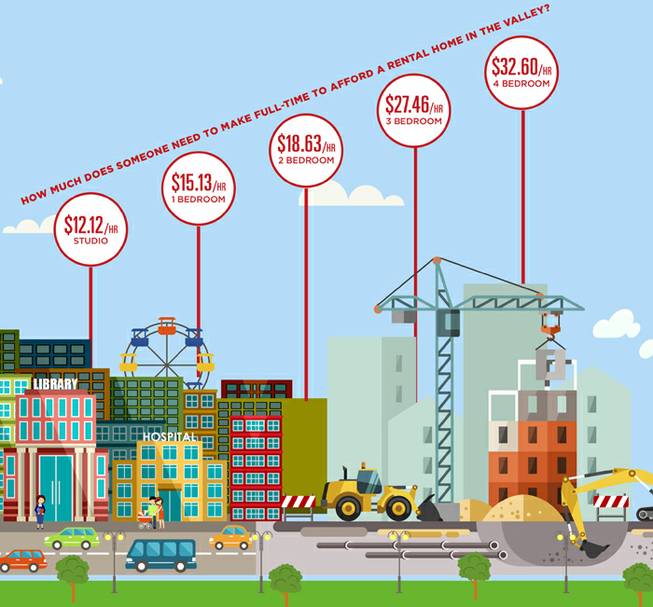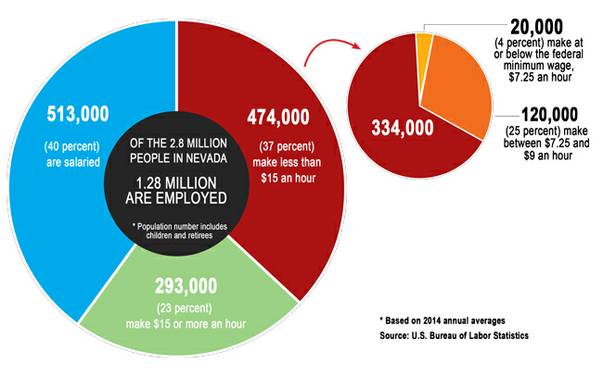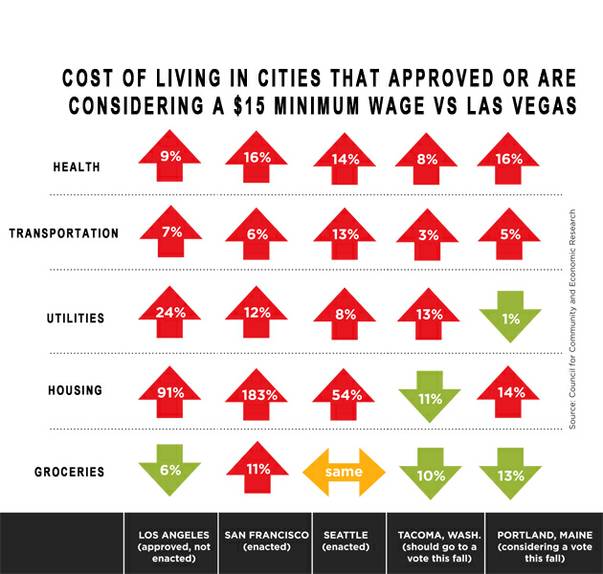
Monday, July 6, 2015 | 2:01 a.m.
How does Las Vegas compare?
Living in Las Vegas is markedly cheaper than living in other major cities that have passed $15-an-hour minimum wage. Housing in San Francisco, for instance, costs 183 percent more than in Las Vegas, according to the Council for Community and Economic Research. Still, Las Vegas’ cost of living is similar to several cities, including Portland, Maine, and Tacoma, Wash., that are considering a $15-an-hour minimum wage.
Hot on the heels of San Francisco and Seattle, Los Angeles became the most recent city on the West Coast to pass a $15-an-hour minimum wage.
The players
• Labor mobilization
Service Employees International Union Nevada has explored a minimum wage initiative, state director Brian Shepherd said, but the union won’t decide until mid-to-late summer whether to move forward with a campaign.
Similarly, the Culinary Union is talking about a “plethora” of options as the 2016 election approaches, including registering members to vote and looking at a potential minimum wage initiative, political director Yvanna Cancela said.
The AFL-CIO is focusing its efforts on raising the minimum wage in Nevada by hosting an AFL-CIO Raising Wages Summit this year.
Though the unions say they remain undecided about whether to pursue an initiative, state Sen. Tick Segerblom, who sponsored the state constitutional amendment to raise the minimum wage to $15 an hour, said he wouldn’t be surprised if an initiative appeared on the ballot.
“At the end of the day, I think the minimum wage will be about $15,” Segerblom said. “But that’s one of the questions: Do you move it up $1 or $2, incrementally? Eventually, I think it needs to be about $15. Someone working 40 hours a week right now isn’t above the poverty line.”
If an initiative does not appear on the ballot in 2016, Segerblom said he hopes to bring a constitutional amendment back to the Legislature in 2017.
• Companies that already boosted minimum wage
Several companies have taken it upon themselves to boost worker pay.
Wal-Mart in April increased its minimum wage to $9 an hour and promised to raise it to $10 an hour by February 2016, which will result in raises for 500,000 of its 1.3 million employees.
The Gap raised its minimum wage to $10 an hour.
Ikea raised pay for thousands of U.S. workers by an average of 17 percent to $10.76 an hour. Starting Jan. 1, the furniture chain’s minimum wage will rise again, to $11.87.
Health insurer Aetna has said it would pay a minimum of $16 per hour, more than double the federal minimum wage.
• Companies challenging Nevada’s minimum wage
Five restaurant chains — including Landry’s, Bubba Gump Shrimp Co. and Dotty’s — challenged the constitutionality of Nevada’s minimum wage law in a federal lawsuit filed last month.
The lawsuit alleges Nevada’s regulations violate both the state and the U.S. constitutions because different wages are offered to employees who receive work-sponsored health insurance and employees who don’t.
Nevada’s current minimum wage — $8.25 an hour, or $7.25 an hour if health insurance is offered — is the product of a 2006 amendment to the state constitution. Owners of the restaurant chains say all minimum wage employees in Nevada should earn $7.25 per hour.
Los Angeles’ increase, which won’t be fully instituted until 2020, is the latest in a trend of minimum wage increases across the nation. In 2014, lawmakers in 10 states and Washington, D.C., raised the minimum wage, and voters in four more states approved increases through ballot measures.
Now, some are wondering: Is Nevada next? The minimum wage here is $8.25 an hour for employees who aren’t offered employer-sponsored health insurance and $7.25 for those who are.
This year’s legislative session saw various pushes to change the state minimum wage.
■ A Republican-backed Senate bill would have raised it to $9 an hour for employees who aren’t offered health insurance by their employers.
■ A Democratic-backed state constitutional amendment would have raised the minimum wage to $16 an hour for workers who aren’t offered health insurance and $15 an hour for those who are.
■ A Republican senator introduced a resolution to repeal the state’s constitutional minimum wage and tie the minimum wage instead to the consumer price index.
However, the bill failed — narrowly — and the constitutional amendment and resolution never received committee votes.
The last time Nevada increased its minimum wage was in 2010, to automatically adjust for changes in the cost of living. Many politicians, union leaders and economists say Nevada’s minimum wage remains far below a living wage.
Some unions now are looking ahead to the 2016 election, considering whether to push for an initiative to boost the state’s minimum wage.
But what would a minimum wage increase actually mean for Nevada? The answer isn’t entirely clear, and experts on both sides of the issue disagree about the effect.
Little research has been done on how an increase would affect Nevada’s unique economy. It largely depends on how much wages increase — minimum wages of $9, $10.10 and $15 an hour all have been discussed at the state and federal levels — and over what timeframe an increase goes into effect.
What an increase would mean for:
Tourism
A moderate increase in the minimum wage is unlikely to significantly affect tourism, economists say.
If the minimum wage were to rise marginally, businesses in the tourist corridor could pass along the cost of higher wages to tourists in the form of higher prices. But price jumps likely wouldn’t be severe enough to deter tourists from visiting, as people come here with the expectation of spending money.
“You may see a small increase in the price of restaurant meals and these things, but these are high-end meals, so in terms of the overall percentage, it’s not that much of an increase in price,” UNLV economics professor Bradley Wimmer said.
When Santa Fe, N.M., was considering raising its minimum wage in 2004, business owners worried a ripple effect might hurt its tourism industry. But a 2007 study by the University of New Mexico found no such effect, despite Santa Fe raising its minimum wage from $5.15 an hour to $8.50 an hour in 2004 and to $9.50 an hour in 2006.
Santa Fe’s minimum wage now is $10.84, having been adjusted for changes in the consumer price index.
Las Vegas’ tourism industry likely would be similarly unhurt by an increase in the minimum wage, said research professor Lee Reynis of the University of New Mexico’s Bureau of Business and Economic Research, which has conducted several studies on the minimum wage in Santa Fe.
“People who go to Las Vegas go to spend money with the hope of making money,” Reynis said. “They would do fine. This is not going to hurt them.”
Impacts, however, could be greater with a large, sudden wage increase.
“Do I believe that the economic impacts — and by that I mean jobs, wages, salaries and economic output — if we increase the minimum wage to $9 would be devastating? No, I don’t,” said Jeremy Aguero, an analyst at economic research firm Applied Analysis.
But if Nevada suddenly raised the minimum wage to $15 an hour, consumers could see significantly higher prices in the tourism, retail and quick-service restaurant industries, Aguero said.
“At $15 an hour, that impact becomes substantially more,” Aguero said.
An increase in the minimum wage may not directly affect many workers on the Strip such as servers, maids and bartenders since many of them already make more than minimum wage.
“There are not a whole lot of minimum wage workers in the tourism industry,” said Jeff Waddoups, a UNLV professor of economics. “Those jobs, even if they’re not unionized, have to compete with union salaries, and those jobs are all significantly above the minimum wage.”
Minimum wage workers
Raising the minimum wage is good for workers in that they bring home more money. But it could lead to businesses cutting minimum wage positions, economists say.
“For those who are working and earning the minimum wage, if they’re able to keep their jobs, they’ll have higher incomes and be better able to afford things,” said Stephen Brown, director of the Center for Business and Economic Research at UNLV. “Whether that reduces employment or not is a matter of controversy.”
It’s often cheaper for a business to restructure a minimum wage position or automate a job rather than pay a minimum wage increase.
Tipped workers
A wage increase would be wholly positive for the state’s tipped workforce.
Nevada is one of a few states, including California, Oregon and Washington, that requires employers to pay tipped workers the full state minimum wage before tips. Some states allow employers to pay workers a federal tipped minimum wage of $2.13 an hour, with the understanding that the worker’s tips will equal at least the federal minimum wage of $7.25 an hour or the employer will make up the difference.
“Things like tip credits don’t exist here, so a tipped worker could be making three, four or five times the minimum wage — it’s not terribly uncommon,” Aguero said.
If the minimum wage were raised to $9 or $15 an hour, tipped workers simply would make that much more in addition to any tips received.
Salaried workers
Salaried workers with moderate to high pay likely won’t feel any impact if the state’s minimum wage is raised.
But salaried workers who earn wages only slightly higher than the minimum wage could benefit from a ripple effect. A minimum wage increase typically also boosts pay for people who make slightly more than minimum wage.
For instance, if a minimum wage worker makes $8.25 an hour and suddenly has her wages raised to $9 an hour, businesses often also will raise the wages of a worker who already was making $9 an hour, perhaps to $9.75 an hour.
Businesses
Economists disagree about whether raising the minimum wage would hurt local businesses.
In Santa Fe, it didn’t.
“Clearly there were businesses that went out of business,” Reynis said. “But did they go out of business for this reason? Probably not.”
Similarly, a study of San Francisco, which raised its minimum wage in 2004, found the wage hike had no significant impact on business.
But in Seattle, some business owners have said they would have to close because of higher labor costs after the city increased its minimum wage to $11 an hour in April. The minimum wage will jump again to $15 an hour in 2017.
“What you typically see when there are discussions about raising the minimum wage is that ‘we need to lift people out of poverty and, by raising the minimum wage, we’ll accomplish that,’ ” said Chantal Lovell, of the Nevada Policy Research Institute, a libertarian think tank. “It sounds really nice — if companies can pay employees. But most companies don’t have that extra money available. It’s not just massive corporations but the mom-and-pops, the restaurants, the franchises.”
Poverty
Raising the federal minimum wage to $10.10 an hour would lift 900,000 people out of poverty nationwide, while raising it to $9 an hour would lift 300,000 people out of poverty, the nonpartisan Congressional Budget Office found. Federal officials estimate there will be about 45 million people in families whose income is below the poverty line in 2016.
Looking to the 2016 presidential election
On a national scale, Democratic presidential contenders have sought to prove their progressiveness by declaring public support for increasing the federal minimum wage from $7.25 to $15 an hour.
Hillary Clinton, for example, recently spoke via telephone at a rally of 1,300 fast-food workers in Detroit, encouraging workers to continue their fight for a higher federal minimum wage.
“We need you out there leading the fight against those who would rip away Americans’ right to organize, to collective bargaining, to fair pay,” Clinton said.
However, unlike two of her Democratic opponents, Vermont Sen. Bernie Sanders and former Maryland Gov. Martin O’Malley, Clinton has never explicitly said she supports a $15-an-hour federal minimum wage, voicing only general support for the movement and an increase in the federal minimum wage.
Republican presidential contenders, by and large, have dug in their heels in staunch opposition to any increase in the federal minimum wage. Many say the matter is best left up to the states.
Notably, former Pennsylvania Sen. Rick Santorum has said he opposes too large of an increase in the federal minimum wage but would support raising the minimum wage 50 cents an hour each year for three years.



Join the Discussion:
Check this out for a full explanation of our conversion to the LiveFyre commenting system and instructions on how to sign up for an account.
Full comments policy